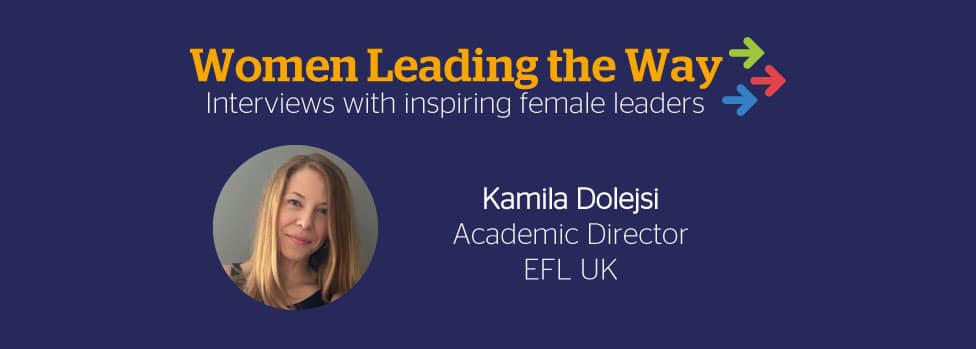Women Leading The Way: An Interview with Kamila Dolejsi, Academic Director of EFL UK at Oxford International Education Group

In the fifth interview in our Women Leading the Way series, we sat down once again (virtually of course) with a female leader in the education sector to discuss gender diversity and ask her advice as a woman in leadership.
This month we spoke to Kamila Dolejsi. Kamila has been involved in the TESOL industry for more than 15 years. She holds a degree in Linguistics and TEFL certification from Simon Fraser University, Canada and she is DELTA qualified. Originally trained in Canada, she spent almost a decade teaching ESL and teacher training in the Czech Republic, before joining Oxford International in 2011, as the Director of Studies in a junior summer centre.
After joining the head office team in 2014, Kamila is now the Academic Director for EFL UK division of Oxford International. She has also recently taken on the role of Academic Director of Oxford International’s higher education and pathways digital projects, including online testing and pre-sessional programmes.
The BBC recently reported that companies with better gender diversity at Executive level perform better, why do you think that is?
I am sure there are a number of reasons that have been well researched and documented but my personal experience is that female executives tend to be more process orientated while men tend to be more driven by results and outcomes. I think that if you have strong processes in place, you invest more into your team to ensure they understand them, implement them and own them. As a result the whole team becomes stronger and performs better.
How do you think the education sector can become more gender-diverse?
I think the whole education sector needs to become more open-minded. Yes we have got the interactive whiteboards and tablets in our classrooms but in terms of the educational structure itself and the role of a teacher, not much has changed. Naturally, the sector tends to attract the same type of individuals, the same type of thinking. To bring more diversity into education we must actively seek to bring in gender, race, religion, and identity that are as different as possible and often different from what we are traditionally familiar and comfortable with. Doing so will allow us to bring up generations that will consider a truly diverse work environment as a norm rather a policy tick-box.
What’s one leadership lesson you’ve learnt in your career?
Just one? I guess it would have to be risk-taking. I am a very practical person and I like things to be tried and tested but I have learnt that if you are not willing to step outside of your comfort zone from time to time and try something new, you can easily become obsolete.
What has been your most significant career achievement so far?
Probably working on the BEO programme. I feel immensely proud of the programme and of everyone who works on it. It really is one of a kind and it tests you. It tests your creative as well as managerial limits but it is also so incredibly rewarding. I do not think there is anything else I have ever done that compares to the feeling I get when I see students bring the guidelines alive.
Who has inspired you in your career, and why?
To be honest I do not think there was one particular person. I have been very lucky with managers, mentors, colleagues, and even friends who were always supportive and willing to share their knowledge and expertise. However, my first full-time teaching job at a language school in Prague was probably the most formative one. It was an environment where learning and growth were an inherent part of the working culture so it was very motivating and it awakened ambitions in me that I did not know I had.
What advice do you have for women aiming for leadership positions?
Love what you do. Better, do what you love. I know it may sound as cliché but I honestly believe, that people who are passionate about their jobs and genuinely engaged with their work, inspire that in others. Lead by example.
